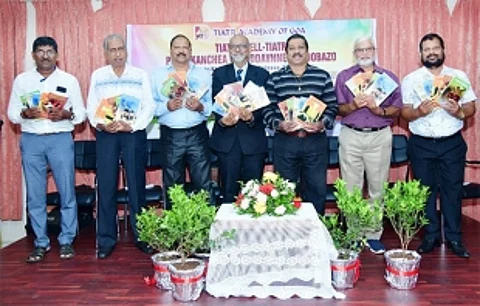

Five books on tiatr were released yesterday at the Tiatr Academy Goa. This was under its scheme ‘Preservation of Tiatr Literature’. Five books namely ‘Devan Ghoddlem Mon’xan Moddlem’ a tiatr, ‘Soccorina’ a Khell-Tiatr written by Menino Fernandes alias Menino de Bandar, ‘Mhoji Maim Mhoji Dusman’ a tiatr, ‘Hie Chukik Bhogsonnem Asa?’ a Khell-Tiatr written by Mario Menezes and ‘Amcho Bharot Mahan’ (Don Tiatr) written by the late Fr. Nevel L. S. Gracias was released.
Dr. Andre Rafael Fernandes, retired
Professor, H.O.D (Department of English) was the Chief Guest while Tomazinho
Cardozo and Fausto V. Da Costa spoke on the books. More books in the language
and in this case the Romi script are to be welcomed no doubt. But how healthy
is Konkani literature? Are books from other languages being translated into
Konkani? Or for that matter the other way round.
Dr. Andre Rafael Fernandes was of the
opinion that not many translations from other languages into Konkani were
taking place. He said it would be possible to count the number of translations
that had taken place. Dr Andre said “Translation is a field in which a lot of
scope is present in both ways from Konkani into English or any other language
and other languages into Konkani. Translations have taken place of novels by
Mauzo, there have been some poems which have been translated from Konkani into
other languages.” Asked if there was a paucity of good translators, absence of
interest or a paucity of finance to fund such initiatives, the doctor admitted
it was a bit baffling why this had not happened. He said so many books were
translated into so many languages, like Portuguese, Russian, and French but in
Konkani this movement for translation, he felt had not taken off. He admitted
there was a lot of scope because very few books had been translated and why that
had not happened he said remained a mystery. Dr Andre wondered if it was due to
the lack of a reading habit, because if there was such a culture a translator
would feel motivated. Since most readers in Goa would read in English and not
Konkani, there would not be much of a market for him in that language. The
Sahitya Academy he said encouraged translation so those dynamics he felt could
be in play. He pointed out that there were other sources of entertainment like
the digital media and people had choices and people were reading less. There
were the diehard fans that still needed a book in their hands, he admitted but
on the whole there was a crisis and the book shops were experiencing tough
times. When asked about the absence of a standardised script and the politics
that went with it, he said a lot of material was available in the Kannada
script which not many people were aware of. He felt this could be a reason why
translations were not taking place that easily. Dr Andre said the politics of
the script had a lot to do with it too with a lot of people just not interested
in reading in the other script which resulted in the audience reducing even
further. This problem he felt would not be sorted out easily because it was
entrenched. Speaking of the launch of the five books he said it was heartening
and encouraging to see this and these books could be used as research material
for students.
Tomazinho Cardozo writer in English and Konkani as well as a
tiatrist speaking about translations said work was done in the Devnagari script
but in the Roman script not much had been done. Asked why this was the case, he
said one needed manpower and also the readership. He said “When you do a
translation of an international book, you need a market and if there is no sale
then what is the purpose? I don’t think individuals can do this, it has to be
done by institutions like the tiatr academy or other institutions”. The
reduction in readership he said was a reality in Konkani as well as in other
languages. It is difficult to sell even five hundred copies. These books were
sold to libraries and sale was possible. Every author has his or her
readership, he said. Asked about the future of Konkani literature, he said the
young generation was keen on English but even then the young generation was not
reading in that language. It was a problem across languages.
Mario
Menezes speaking after the event said the book he authored was due to his love
for the language but he was very sure it would be sold in the market. These
books would go to libraries across the state and perhaps even to other states
and used for research. Menino Fernandes smiled and said the book he had
authored was based on a true story that took place in the eighties. It is about
an extra marital affair, a murder and how the culprit was caught. The tiatr he
said ran for over three hundred shows and he was the first to take it to the
gulf region in 1985.